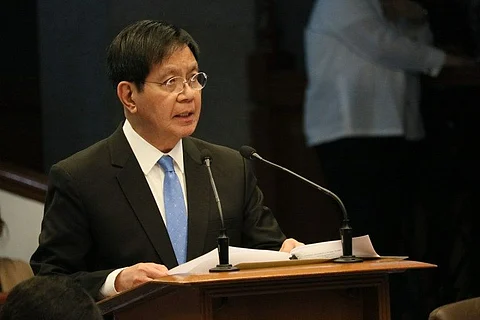
- NEWS
- the EDIT
- COMMENTARY
- BUSINESS
- LIFE
- SHOW
- ACTION
- GLOBAL GOALS
- SNAPS
- DYARYO TIRADA
- MORE

Amid widespread devastation caused by days of flooding triggered by recent typhoons and the enhanced southwest monsoon (habagat), Senator Panfilo “Ping” Lacson is calling for an integrated and long-term national master plan to address the country's recurring flood woes.
In a radio interview on Saturday, Lacson demanded accountability for nearly P2 trillion in flood control funds spent over the past 15 years.
Lacson questioned the effectiveness of existing flood management programs and raised concerns about how government funds have been used, or possibly misused, since 2011.
“What happened to the huge amounts we spent in the last 15 years? Was there any progress? If the flood control policies and programs were not effective, we should see where we went wrong and make the needed corrections,” Lacson lamented.
Citing government budget data, Lacson revealed that the Department of Public Works and Highways (DPWH) received P1.90788 trillion, roughly P348 million per day, for flood control projects from 2011 to 2025.
However, he noted that many of these projects were either delayed or flagged as “For Issuance of SARO” (FISARO), indicating potentially large sums of unutilized funds.
He also pointed out that this figure may not even represent the full amount spent on flood control, as it does not yet include allocations for other agencies such as the Metropolitan Manila Development Authority (MMDA).
“For accountability, we need to see how the funds were spent and find out who was responsible for it,” Lacson said.
The senator, who is a longtime anti-corruption advocate, called for the prosecution of contractors and government officials found to be involved in substandard or fraudulent flood control projects.
Beyond financial scrutiny, Lacson emphasized the urgent need for a shift in planning strategy.
He urged the government to adopt long-term, 20-year flood control blueprints, similar to those used in countries like the United States, instead of the Philippines’ usual 5- to 6-year plans that are vulnerable to political turnover.
“Can’t we have a long-term master plan so the program will go on regardless of changes in administration? The United States has that, so people know what to expect for the next 20 years. We don’t have that,” he lamented.
He further pushed for regional coordination among local government units (LGUs), stressing that flood management cannot be done in isolation.
“We cannot insulate a town or city in formulating a flood management program because floods may spill over to its neighboring areas,” Lacson said.
“The planning should be integrated at least at the regional level.”
Meanwhile, Lacson stressed it is time as well to make sure erring contractors and those involved in faulty flood control programs are jailed or penalized, if only to discourage others from engaging in corruption.
“To prevent others from taking part in this practice, we should make sure those involved are punished. Otherwise, they will be encouraged to make big money through this,” he said.
Lacson also reiterated his call for increased public participation and transparency in the national budgeting process.
He refiled a bill seeking to institutionalize the involvement of accredited non-government organizations (NGOs) and civil society groups in budget preparation, including in bicameral conference deliberations.
“We need to be vigilant again, to put corrupt legislators on notice,” he said.
With the country reeling from the aftermath of intensified flooding, Lacson's appeal renews the spotlight on the need for not just bigger budgets, but smarter, more accountable governance to protect communities and infrastructure from climate-related disasters.
